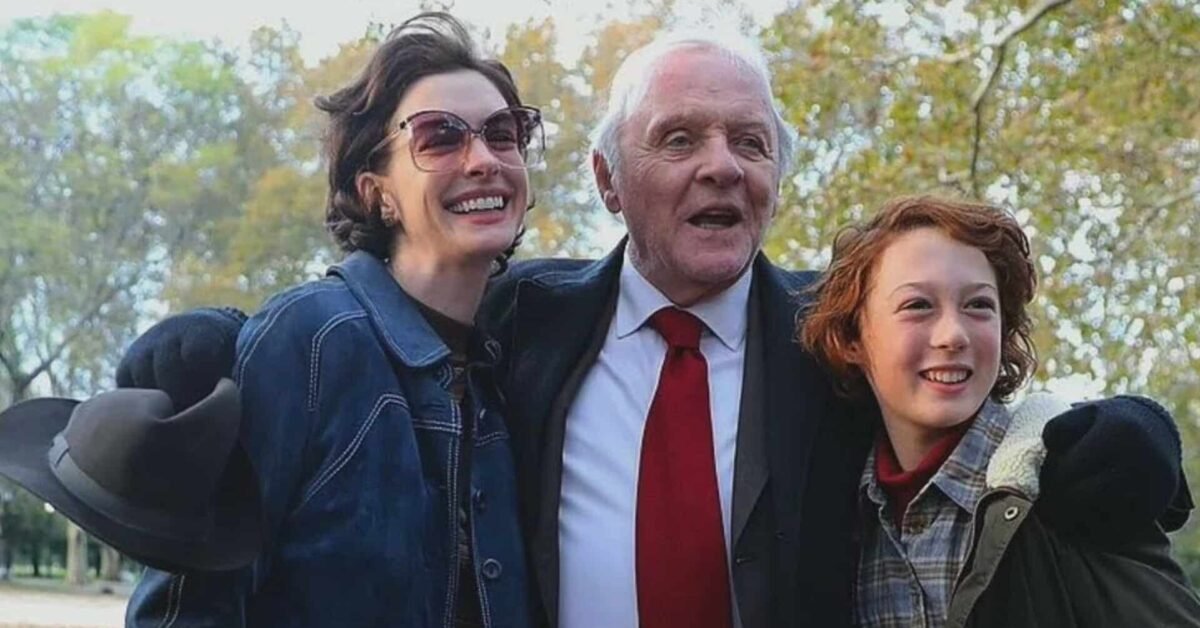ARMAGEDDON TIME is a personal story from the battle for the soul of middle class Jews
Written and directed by James Gray
Starring Banks Repeta, Anne Hathaway, Jeremy Strong, Anthony Hopkins
Rated R for language and some drug use involving minors
Runtime: 1 hour 55 minutes
Screening at the Philadelphia Film Festival, limited release October 28, wide release November 4
by Ryan Silberstein, Managing Editor, Red Herring
Set in Queens, in the fall of 1980, Armageddon Time is the story of Paul Graff (Banks Repeta), a public school sixth grader who struggles with classroom learning. Not only does he prefer art to paying attention in class, but his best friend, Johnny (Jaylin Webb), is also a mischievous troublemaker starting sixth grade for the second time. Because of their different racial backgrounds, their friendship must not only endure the efforts of their teacher to keep them apart, but Paul’s parents' own prejudices. After getting in serious trouble, Paul’s grandfather (Anthony Hopkins) offers to help Paul by paying for his tuition at the private Kew-Forest School, which has a much more homogenous and well-connected student body than the public school.
While the premise and ties to Gray’s own childhood mark similarities with last year’s Belfast, Armageddon Time is not as maudlin as Kenneth Branagh’s self-examination. While both protagonists are wide-eyed and precocious, Gray doesn’t offer any excuses for Paul. If Paul would pay attention a bit more, both in school and in life, he might not be such an ignoramus. But it is also likely that this film was a more resonant experience for me specifically because I found so many echoes of my own childhood. Growing up in a very middle class family that was sort of mixed-faith, my upbringing wasn’t exactly like Paul’s. But there are more than enough parallels and specific details in Armageddon Time that felt familiar to me, making watching the film a bit of an out of body experience.
So a bit of personal context may be in order. My father was raised Jewish, and grew up a mile and half from the house we lived in for my entire childhood in Northeast Philadelphia (basically the Philly equivalent of Queens). My Catholic mother grew up in Bensalem, also only a few miles away. My world was pretty insular. Like the Graffs, my parents were on the nebulous border between middle class and working class, a fragile inflection point where any disaster or change in the status quo could have gone disastrously for us. Also like the Graffs, there were definitely a few times where my grandparents were a financial lifeline. But like Paul, I had enough comforts and knew enough other kids that were worse off that I never really questioned our situation.
Also similarly to Paul, I was oblivious to antisemitism and racism for a good part of my childhood. One of the paradoxes for parents that I see as an adult is: how do we prepare kids for the reality of the world while giving them hope to change it for the better? I am not sure there is an answer, but entering sixth grade, I also moved from a public elementary school to a Catholic school. My mom said she didn’t want her kids going to a school that had bag searches and metal detectors (this was still a few years before Columbine). But she also had frequently complained about the disruptions in my classes caused by kids bussed in from less affluent areas of the city. My parents’ racial prejudice was always couched in that working class dodge of “good ones vs. bad ones,” despite trying to teach me that everyone was equal. There was definitely a bit of “do as I say, not as I say” so I was raised trying to believe better values than were demonstrated.
Adding to my uncertaintly were my first brushes with antisemitism. Growing up, I was raised Catholic, but we did some Jewish holidays with my dad’s family. Thanks to Jewish custom around how faith is passed down through the maternal line, I often joke now that I got the Jewish last name, but not the religion, but none of this really came to light for me until I was around Paul’s age. I wrote about this a bit in the Spring 2021 issue of MovieJawn, but in my Catholic school it felt like all eyes were on me when we learned about Anne Frank and read her diary. I knew about the Holocaust from my family, as my grandfather and his family had fled Berlin as the Nazis were coming to power. But I didn’t understand antisemitism still existed in my lifetime until I was middle school age.
That feeling was even worse in high school, where it was one of several ways I was made to feel an outsider by my peers. By college, I had made some peace with it, and made my first Jewish friends. This had the side effect of making me feel like either the most or least Jewish person in any given group of people, depending on which friends I was hanging out with. Religion aside, I was even only somewhat culturally Jewish. I had the trademark sense of humor and stereotypical neurosis, but I never went to a Jewish summer camp or to Israel with Birthright. I knew a lot about Hanukkah and Passover, but I never learned a word of Hebrew or celebrated Yom Kippur. All I had to hold onto was a sort of imposter syndrome about my background. People see the last name Silberstein and assume you’re Jewish, but I only ever felt Jewish around people who were unequivocally Gentiles.
Paul has a similar experience when he transfers to a private school. His mother, Esther (Anne Hathaway) and his father Irving (Jeremy Strong), and extended family all see this as an opportunity for Paul and his brother, Ted (Ryan Sell) to connect and eventually join the elites. To get a seat at the table and shape the future of America. They don’t really seem to follow this idea to its logical conclusion. While they sit at home and rile against Ronald Reagan getting elected to the presidency, the school treats his campaign like a pep rally. Paul seems barely aware of Judaism or its rituals, and he doesn’t seem to be studying for his bar mitzvah in a year or two, which makes Paul vulnerable to conservative propaganda.
There are three pulls on Paul’s ethnic/religious identity. His grandfather wants him to become a man with good values, to see the good in the world but understand that being Jewish is to always be at risk. HIs parents seem to encourage Paul to assimilate even more than they have, with the only Jewish activities we see them participate in are a bagels-and-lox brunch and Esther sitting shiva. But they push him toward Kew-Forest, which gives off vague white supremacist vibes, and not just because of the connections to the Trump family. Being a kid, Paul just wants to fit in, whatever that means at the moment. But what does Kew-Forest mean for Paul’s identity and the values his grandfather tries to instill in him? We know they are at odds with capitalist-Protestant values of the school and the racist views of the Trump family. Paul will be out of high school when the Central Park jogger case happens, what kind of person will he be? How will these influences reconcile with each other?
Armageddon Time feels akin to 20th Century Women, but from a Jewish-American East Coast perspective. Paul will learn how to become a man, likely from the men and women around him. While Esther and Irving often seem at a loss on how to deal with Paul, his grandfather is the perfect mix of mentor and co-conspirator. From encouraging the boy’s interest in art and model rockets, to sharing the story of how their family escaped Europe, grandparents are often the sharers of secret knowledge, and Paul’s is the perfect example. Irving, meanwhile, is a source of both love and fear, and even hate. Much like my own upbringing, Paul would rather deal with Esther when he gets in trouble. His father has a temper, and is more likely to come after Paul with a belt. But we also see Irving spreading joy, singing a good morning song while banging kitchen utensils to wake his sons. In these moments I was filled with a hope that Paul will be able to close some of the distance between him and his father as he grows up.
Armageddon Time has more story points to delve into, but all of them swirl around these central themes. How do we pass on our identity? What does it mean to be a good man? And how many of these things are easily not on our minds day-to-day, or taken for granted? Ethnicity and religion are things to be practiced in order to be continued, but the American call to assimilation, the melting pot, is strong. Not just to feel like you belong to this country, but so that you don’t stick out. Paul can “pass” at Kew-Forest, Johnny cannot, even if he was as wealthy as the Trumps. The middle class is kept in line by the elites by offering them just enough status so they can look down on those “beneath” them. Upward mobility is the carrot, state power is the stick. Similarly, Jewish people can “pass” as white, but have historically been left out of power structures, except for conspiracy theory mythology. Paul has run-ins with both over the course of 1980, and his experiences will shape who he is going forward.
The performances are charming and natural across the board, even with the preposterous idea that Anthony Hopkins is playing a character named Aaron Rabinowitcz. Gray’s movies are all about these same things, family, cultural identity, what it means to be a stranger in a strange land. But by dipping into his own life, he brings those themes to life in a more resonant and vulnerable way. These are characters I want to have conversations with because they feel real. Let me sit down at the table and share a bagel with them, please.


